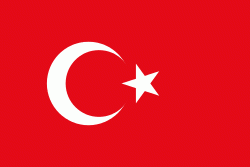Ortaca (Ortaca İlçesi)
Ortaca is a town and district of Muğla Province in the Aegean region of Turkey. Formerly a township depending Köyceğiz administratively, it was made into a separate district in 1987. Apart from Ortaca district center, there is one depending township with own municipality, namely Dalyan.
Ortaca is a typical Turkish working-class town with an economy based on agriculture. It lies midway between Dalaman and Köyceğiz. Its name literally means "the town in the middle", possibly a reference to its location in the middle of the surrounding plain and is indeed a regional hub. The town pulls benefits from this fertile plain and the economy largely depends on tomatoes, citrus fruits, cotton and pomegranates. The market day is on Fridays and the whole town becomes a hive of activity worthy of a visit. A regular bus service operates between Dalaman and Dalyan via Ortaca as well as to other main coastal centers. This burgeoning town has supermarkets, shops, bars and cafes at attractive prices and is only 15 minutes from the international Dalaman Airport, 10 minutes from the marvel of the nature that is Dalyan and 20 minutes from the unspoilt beach at Sarıgerme. In line with recent policies aimed at opening the entire region to international tourism, Ortaca is growing rather fast, which is also a consequence of the rapid population growth in Turkey in general. Ortaca is also becoming an increasingly attractive market for Foreign purchases of real estate in Turkey.
* Dalyan
* Blue Cruise
* Foreign purchases of real estate in Turkey
* Lycia
Ortaca is a typical Turkish working-class town with an economy based on agriculture. It lies midway between Dalaman and Köyceğiz. Its name literally means "the town in the middle", possibly a reference to its location in the middle of the surrounding plain and is indeed a regional hub. The town pulls benefits from this fertile plain and the economy largely depends on tomatoes, citrus fruits, cotton and pomegranates. The market day is on Fridays and the whole town becomes a hive of activity worthy of a visit. A regular bus service operates between Dalaman and Dalyan via Ortaca as well as to other main coastal centers. This burgeoning town has supermarkets, shops, bars and cafes at attractive prices and is only 15 minutes from the international Dalaman Airport, 10 minutes from the marvel of the nature that is Dalyan and 20 minutes from the unspoilt beach at Sarıgerme. In line with recent policies aimed at opening the entire region to international tourism, Ortaca is growing rather fast, which is also a consequence of the rapid population growth in Turkey in general. Ortaca is also becoming an increasingly attractive market for Foreign purchases of real estate in Turkey.
* Dalyan
* Blue Cruise
* Foreign purchases of real estate in Turkey
* Lycia
Map - Ortaca (Ortaca İlçesi)
Map
Country - Turkey
 |
|
| Flag of Turkey | |
One of the world's earliest permanently settled regions, present-day Turkey was home to important Neolithic sites like Göbekli Tepe, and was inhabited by ancient civilisations including the Hattians, Hittites, Anatolian peoples, Mycenaean Greeks, Persians and others. Following the conquests of Alexander the Great which started the Hellenistic period, most of the ancient regions in modern Turkey were culturally Hellenised, which continued during the Byzantine era. The Seljuk Turks began migrating in the 11th century, and the Sultanate of Rum ruled Anatolia until the Mongol invasion in 1243, when it disintegrated into small Turkish principalities. Beginning in the late 13th century, the Ottomans united the principalities and conquered the Balkans, and the Turkification of Anatolia increased during the Ottoman period. After Mehmed II conquered Constantinople (Istanbul) in 1453, Ottoman expansion continued under Selim I. During the reign of Suleiman the Magnificent, the Ottoman Empire became a global power. From the late 18th century onwards, the empire's power declined with a gradual loss of territories. Mahmud II started a period of modernisation in the early 19th century. The Young Turk Revolution of 1908 restricted the authority of the Sultan and restored the Ottoman Parliament after a 30-year suspension, ushering the empire into a multi-party period. The 1913 coup d'état put the country under the control of the Three Pashas, who facilitated the Empire's entry into World War I as part of the Central Powers in 1914. During the war, the Ottoman government committed genocides against its Armenian, Greek and Assyrian subjects. After its defeat in the war, the Ottoman Empire was partitioned.
Currency / Language
| ISO | Currency | Symbol | Significant figures |
|---|---|---|---|
| TRY | Turkish lira | ₺ | 2 |
| ISO | Language |
|---|---|
| AV | Avar language |
| AZ | Azerbaijani language |
| KU | Kurdish language |
| TR | Turkish language |















